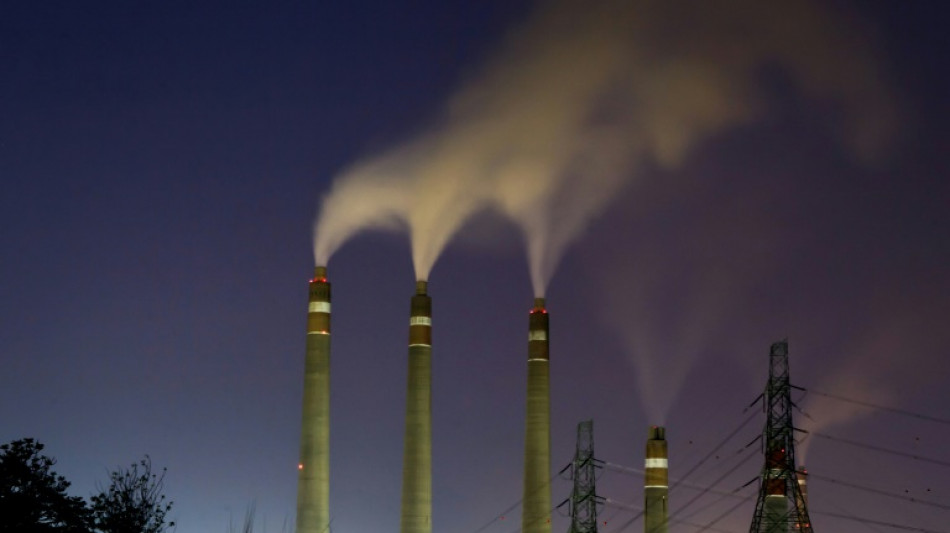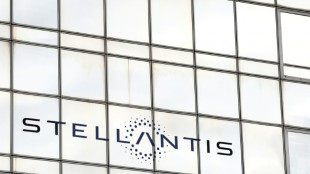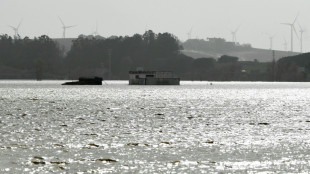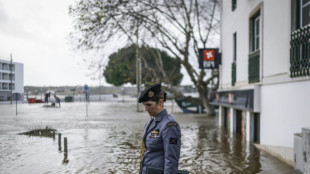
-
 Ice dancers Chock and Bates shine as US lead Japan in team event
Ice dancers Chock and Bates shine as US lead Japan in team event
-
Stellantis takes massive hit on 'overestimation' of EV demand

-
 Stocks rebound though tech stocks still suffer
Stocks rebound though tech stocks still suffer
-
Spanish PM urges caution as fresh rain heads for flood zone

-
 Iran says to hold more talks with US despite Trump military threats
Iran says to hold more talks with US despite Trump military threats
-
Russia accuses Kyiv of gun attack on army general in Moscow

-
 Cambodia reveals damage to UNESCO-listed temple after Thailand clashes
Cambodia reveals damage to UNESCO-listed temple after Thailand clashes
-
Norway crown princess 'deeply regrets' Epstein friendship

-
 Italy set for Winter Olympics opening ceremony as Vonn passes test
Italy set for Winter Olympics opening ceremony as Vonn passes test
-
England's Jacks says players back under-fire skipper Brook '100 percent'

-
 Carrick relishing Frank reunion as Man Utd host Spurs
Carrick relishing Frank reunion as Man Utd host Spurs
-
Farrell keeps the faith in Irish still being at rugby's top table

-
 Meloni, Vance hail 'shared values' amid pre-Olympic protests
Meloni, Vance hail 'shared values' amid pre-Olympic protests
-
Olympic freestyle champion Gremaud says passion for skiing carried her through dark times

-
 US urges new three-way nuclear deal with Russia and China
US urges new three-way nuclear deal with Russia and China
-
Indonesia landslide death toll rises to 74

-
 Hemetsberger a 'happy psychopath' after final downhill training
Hemetsberger a 'happy psychopath' after final downhill training
-
Suicide blast at Islamabad mosque kills at least 31, wounds over 130

-
 Elton John accuses UK tabloids publisher of 'abhorrent' privacy breaches
Elton John accuses UK tabloids publisher of 'abhorrent' privacy breaches
-
Lindsey Vonn completes first downhill training run at Winter Olympics

-
 Digital euro delay could leave Europe vulnerable, ECB warns
Digital euro delay could leave Europe vulnerable, ECB warns
-
Feyi-Waboso out of England's Six Nations opener against Wales

-
 Newcastle manager Howe pleads for Woltemade patience
Newcastle manager Howe pleads for Woltemade patience
-
German exports to US plunge as tariffs exact heavy cost

-
 Portugal heads for presidential vote, fretting over storms and far-right
Portugal heads for presidential vote, fretting over storms and far-right
-
Suicide blast at Islamabad mosque kills at least 30, wounds over 130: police

-
 Russia says Kyiv behind Moscow shooting of army general
Russia says Kyiv behind Moscow shooting of army general
-
Greenland villagers focus on 'normal life' amid stress of US threat

-
 Iran, US hold talks in Oman after Trump military threats
Iran, US hold talks in Oman after Trump military threats
-
Stocks waver as tech worries build

-
 Dupont, Jalibert click to give France extra spark in Six Nations bid
Dupont, Jalibert click to give France extra spark in Six Nations bid
-
'Excited' Scots out to prove they deserve T20 World Cup call-up

-
 EU tells TikTok to change 'addictive' design
EU tells TikTok to change 'addictive' design
-
India captain admits 'there will be nerves' at home T20 World Cup

-
 Stellantis takes massive hit for 'overestimation' of EV shift
Stellantis takes massive hit for 'overestimation' of EV shift
-
'Mona's Eyes': how an obscure French art historian swept the globe

-
 Iran, US hold talks in Oman
Iran, US hold talks in Oman
-
Iran, US hold talks in Oman after deadly protest crackdown

-
 In Finland's forests, soldiers re-learn how to lay anti-personnel mines
In Finland's forests, soldiers re-learn how to lay anti-personnel mines
-
Israeli president visits Australia after Bondi Beach attack

-
 In Dakar fishing village, surfing entices girls back to school
In Dakar fishing village, surfing entices girls back to school
-
Lakers rally to beat Sixers despite Doncic injury

-
 Russian pensioners turn to soup kitchen as war economy stutters
Russian pensioners turn to soup kitchen as war economy stutters
-
Japan taps Meta to help search for abuse of Olympic athletes

-
 As Estonia schools phase out Russian, many families struggle
As Estonia schools phase out Russian, many families struggle
-
Toyota names new CEO, hikes profit forecasts

-
 Next in Putin's sights? Estonia town stuck between two worlds
Next in Putin's sights? Estonia town stuck between two worlds
-
Family of US news anchor's missing mother renews plea to kidnappers

-
 Spin woes, injury and poor form dog Australia for T20 World Cup
Spin woes, injury and poor form dog Australia for T20 World Cup
-
Japan's Liberal Democratic Party: an election bulldozer


Can a $20 billion bet wean Indonesia off coal?
Less than a year after it was announced, a $20 billion bet to wean Indonesia off coal is mired in controversies over financing and the construction of new plants to power industry.
The Just Energy Transition Partnership (JETP) for Indonesia was unveiled last November, as the country hosted the G20 summit in Bali.
It follows a model first trialled in South Africa, and subsequently announced for Vietnam and Senegal, with rich countries pledging funds for the developing world's energy transition.
The basic premise is simple: public and private financing of up to $20 billion, in exchange for Indonesia peaking power sector emissions by 2030 and reaching net-zero power sector emissions by 2050.
That brings forward Jakarta's previous pledges and would see one of the world's top coal exporters and coal power generators weaning itself from the polluting fossil fuel.
But after the initial fanfare has come the much tougher business of plotting a path to those goals.
In August, Jakarta postponed the release of its JETP roadmap, in part over problems calculating its expected emissions.
Indonesia's JETP assumes the power sector was on track to emit 357 million tons of carbon by 2030, and will now limit that to a peak of 290 million tons.
But those figures failed to account for a number of new "captive" coal plants, which power factories rather than feeding into the grid.
So, "the question arises: can the target of 290 million tons still be achieved," asked Fabby Tumiwa, executive director of the Institute for Essential Services Reform (IESR), an Indonesian energy think tank.
"And is the commitment of $20 billion... adequate to achieve that target?"
The JETP secretariat did not respond to a request for comment.
- 'Not the way to do it' -
Jakarta is reportedly also unhappy about the deal's proposed mix of financing, worried it will be offered mostly market-rate loans that saddle it with debt.
"Indonesia is hoping for a larger share of grants," said Anissa Suharsono, energy policy associate at the International Institute for Sustainable Development.
She pointed to a Bloomberg report suggesting Indonesia could expect just $289 million in grants, with half earmarked for technical assistance.
"That is, in my view, outrageous. If it's meant to be a climate fund to encourage a developing country to faster transition, then this is not the way to do it," Suharsono told AFP.
The scale of the funding is another sticking point.
The JETP is not intended to cover all transition costs, with backers saying it should encourage other investors.
But estimates for the cost of achieving Indonesia's pledged goals are upwards of $100 billion, Tumiwa said, and that figure could be higher given the emissions miscalculation.
Even if an agreement on the financing mix can be hammered out, there are other stumbling blocks.
Indonesia, which generates over 60 percent of its power from coal, has many more coal plants than South Africa -- one of the world's largest emitters of greenhouse gases, and they are much younger.
That makes them more expensive to retire, with many more years of potential returns on investment to compensate when shuttering them.
- 'Nothing is perfect' -
Solar and wind power account for less than one percent each of Indonesia's current power mix, and the archipelago's grid is both decentralised and needs upgrading to handle the intermittent nature of renewable energy.
The appetite for financing those upgrades may be low because state-owned Perusahaan Listrik Negara, commonly known by its acronym PLN, has a monopoly on the power sector, added Suharsono.
"Who's going to invest money in a grid that is going to belong to someone else?"
Experts also warn Indonesia needs to prepare for the economic impact of shifting from coal, an industry that directly employs around 250,000 people, according to IESR.
"The coal regions like in Kalimantan and south Sumatra, they are very reliant on the income from coal extractions and economic activities created from these coal extractions," said Rezky Khairun Zain, climate and energy senior analyst at the World Resources Institute, Indonesia.
"The government needs to set up capacity building not only for the workers but also the (local) governments, for them to find another way to increase the income not from the coal activities," he told AFP.
For all the challenges, Tumiwa believes the programme is the best option on the table.
"Nothing is perfect. The funding is still insufficient, and the negotiations are still challenging," he said.
"But we must proceed, at least to demonstrate that this concept can work and serve as a model."
T.Samara--SF-PST




